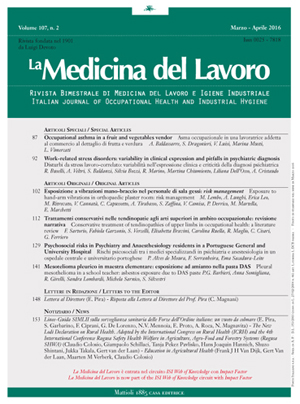Psychosocial risks in Psychiatry and Anaesthesiology residents in a Portuguese General and University Hospital
Main Article Content
Keywords
Physicians, psychosocial risks, medical residents, psychiatry residents, anaesthesiology residents, COPSOQ
Abstract
Background: Medical Doctors (MD), although at the front line of response to patients and their families, are seldom study subjects for occupational psychosocial risks and work related stress. Objectives: Assess psychiatry and anaesthesiology residents in a central and university Portuguese Hospital for the presence of psychosocial risks at work. Methods: We used the Copenhagen Psychosocial Questionnaire version 2 (COPSOQ), which was applied face-to-face in two group settings, in April 2014. It comprised a sample of 19 Psychiatry residents and 20 Anaesthesiology residents. Statistical analysis was done by correlational analysis using Pearson’s coefficient (r) and the t-student test for categorical variables. Results: An occupational health risk (red flag) was found for residents in the “Cognitive demands” dimension of COPSOQ and a health risk (red flag) in the “Work influence” dimension for the female Anaesthesiology sub-group. A possible risk (yellow flag) was found in 17 dimensions. Results also showed moderate correlations between various COPSOQ dimensions and the emergency department workload, workload, home study, number of children, year of training and the medical specialty variables. Conclusions: These results suggest that residents have a health risk which derives from the cognitive demands of their work and that it increases with the workload. This implicates the need for occupational health measures to be taken to manage and reduce these psychological risks.





